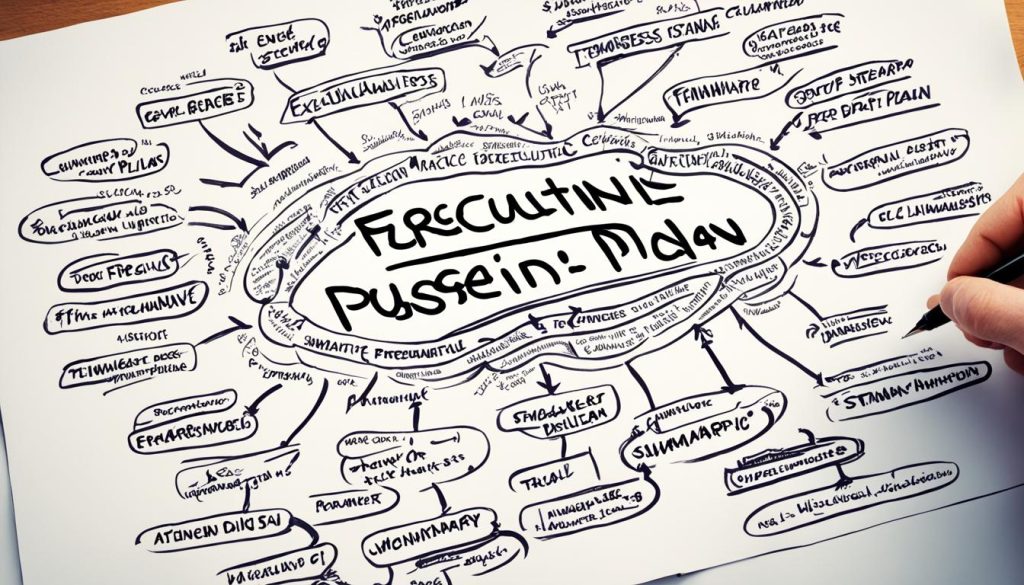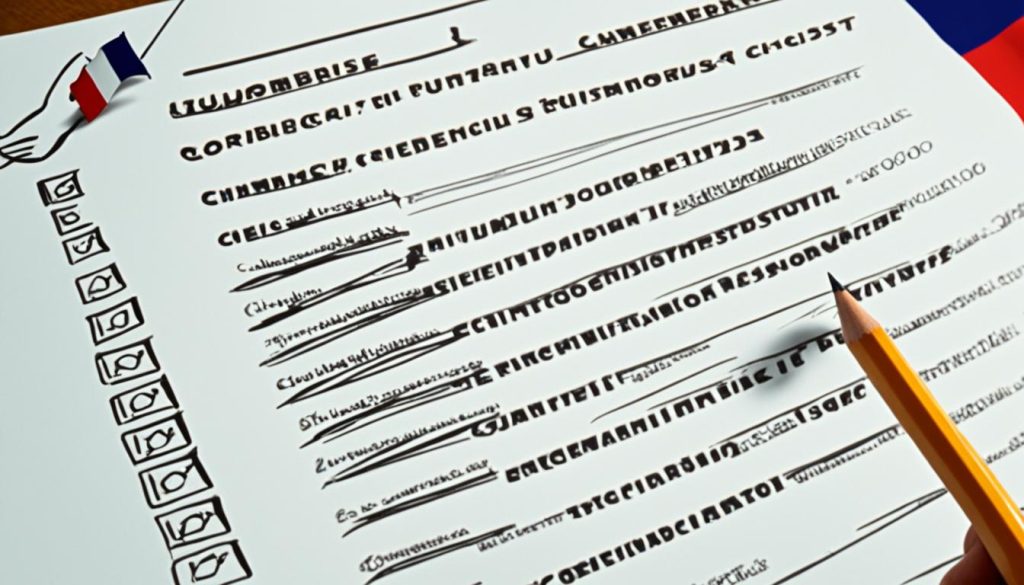Starting a business in France requires a careful plan to ensure success. You must analyze the market and competition. This step helps to see if your business idea will work and learn what customers like. Then, choose a fitting business name and structure. Also, you’ll need to write a detailed plan. This plan should state your goals and how you intend to reach them.
Registering your company legally and understanding taxes and permits is crucial. You also need to find money to start through grants, loans, or investors. Managing your finances well is key for a good start and to keep going. Creating a strong brand and marketing for the French market is important. Lastly, follow local laws and make plans for growing your business in the future.
Key Takeaways
- Conduct thorough market research and competition analysis when starting a business in France.
- Choose an appropriate business name and structure for your company formation in France.
- Draft a comprehensive business plan detailing your mission and strategies.
- Ensure legal registration, tax compliance, and necessary permits are in place.
- Secure appropriate financing and establish effective financial management practices.
- Develop a strong brand identity and targeted marketing strategies for the French business setup.
- Maintain compliance with local regulations and plan for sustainable future growth.
Research the Market and Your Competition

Understanding the French market is key to knowing what French customers need. A thorough analysis can show demand for your products or services. It also spots chances for growth. Knowing your competitors is vital too. It helps place your business wisely in the market.
Understanding Market Needs
Doing a full market study in France helps find out consumer desires. You’ll look into how consumers behave, what they like, and their buying habits. Knowing this lets businesses cater to French tastes more effectively.
Identifying Competitors
Knowing your competitors well is crucial for success. Find out who they are and what they do well (or not). This lets you see where your business fits. It’s key to making strategies that make you stand out.
Finding a Unique Selling Proposition (USP)
Your USP makes your business different from others. Businesses that stand out usually meet needs not met by others or offer something special. Identifying your USP helps find your business’s niche. This makes sure it attracts and keeps customers.
Write a Business Plan and Choose Your Company Name

When making a business plan in France, it’s crucial to set clear mission and goals. This plan is your company’s foundation. It helps you reach targets and stay strong in the competitive market.
Defining Your Mission and Goals
Start by finding out your venture’s main purpose. Ask yourself about your long-term dreams and the difference you want to make. Having clear and simple goals gives your team a common direction.
Outlining Business Strategies
It’s essential to turn your mission into a plan of action. Think about your marketing, how you’ll talk to customers, and the way things will run day-to-day. This helps align your team’s work with your goals.
Selecting a Memorable Name
Choosing a name for your French business is both creative and strategic. It should reflect your mission and mean something to your audience. Make sure it’s unique, legally okay to use, and works for the future. Testing it with potential customers can also help you pick well.
Register Your Business in France

Starting a business in France needs you to follow important steps, like registering your company. It’s key to understand and follow these steps to set up smoothly in the French market.
Choosing the Business Structure: Sole Trader, Partnership, Limited Company
First, decide if you want to be a sole trader, form a partnership, or set up a limited company. Each choice affects your legal and tax duties differently. It’s smart to get advice from experts like accountants or lawyers. Picking the right structure will influence how flexible and tax-compliant your business will be in France.
Obtaining Necessary Permits and Licences
Then, you need the right permits and licences, which depend on your business type and location in France. Whether you’re starting a restaurant or an online store, getting the right permits is key to start without problems.
Understanding French Tax Requirements
Knowing all about French taxes is essential. You must register with the tax authorities and understand VAT, corporation tax, and social contributions. Your business structure affects the taxes you’ll pay. This highlights the need for careful planning when registering your company in France.
By carefully taking these steps, your business can meet legal standards and make a strong start in France’s competitive market.
Finance Your Business Venture

Finding enough money is key for any new business, especially in France with its many funding options. There are different ways to get funds, each with its own pros and cons. It’s important to pick the right one.
Start-up Grants and Loans Available in France
In France, you can start by looking into government-supported money help. Bpifrance, for example, gives grants to help new companies grow. These grants and low-interest loans are there to help new firms get going and grow.
Crowdfunding and Peer-to-Peer Lending
Nowadays, crowdfunding in France is a popular way to get money. Websites like Ulule and KissKissBankBank let people who like your idea give small amounts of money. Peer-to-peer lending is another choice, allowing companies to borrow directly from people, often on better terms than banks offer.
Attracting Angel Investors
Getting money from angel investors can really help a start-up. They don’t just bring money, but also advice and connections. Angels look for big ideas and a good plan. You might give up some ownership, but the advantages can be huge.
Effective Financial Management Tips
Getting funds is just the start. Next is managing your money well. Working with a good bank, like BNP Paribas or Société Générale, helps you keep track of finances. It’s also key to have insurance and a good payment system. Plus, keeping clear records and planning ahead will keep your cash flow solid and help spot problems before they grow.
Starting a company in France – essential checklist

Starting a business in France means you need a clear plan. This checklist for creating a company helps you avoid missing crucial steps. It outlines what you should do for a successful launch:
- Market Research: Explore the market to find out what people need. See who your competitors are. Make sure there is space for your product or service.
- Business Plan: Write a detailed plan. Include your goals, how you’ll reach them, and your money plans. It’s key for success.
- Company Name: Pick a name that’s easy to remember. It should reflect what your business does and stands for.
- Registration: Register your business officially in France. Choose the right legal form for it.
- Financing: Get the money you need. Look for grants, loans, or investors to help start your business.
- Brand Building: Work on making your brand known. Develop a marketing plan that speaks to the French audience.
- Operations: Sort out where your business will be, who you’ll hire, and your admin setup.
Once you start, keep an eye on your finances and use government help if you can. It’s important to follow laws and regulations to keep your business going. This checklist covers everything you need for a good start in France.
Building Your Business Brand

Creating a strong brand identity is crucial for a distinctive market presence. It includes visual aspects such as logos and colours. The messaging conveys your values and connects with people. A well-designed brand builds trust and customer loyalty.
Creating a Strong Brand Identity
At the heart of successful business branding is defining your brand identity. Choose elements that appeal to your target audience and mirror your values. Keeping your visuals and messages consistent reinforces your brand everywhere.
Developing a Marketing Strategy
To reach your audience and meet business goals, you need a solid marketing strategy. This means creating marketing plans that showcase your unique points. It’s vital to understand French consumer habits for effective, relevant marketing efforts.
Utilising Online and Offline Channels
Good marketing mixes online and offline channels. This multi-channel strategy broadens your reach and connects with more people. For example, combining social media with traditional ads leads to a unified, effective campaign.
Setting Up Your Business Operations

Starting your business in France means choosing a good location, setting up efficient systems, and understanding French labour laws. These crucial steps help lay a strong foundation for your business.
Choosing a Prime Business Location
Finding the perfect location for your business in France matters a lot. Locations like Paris La Défense or the French Riviera boost your brand’s visibility. You should consider how close you are to customers, suppliers, and services.
It’s also crucial to think about the future growth of the area. This helps ensure it aligns with what you plan for your business.
Setting Up Administrative and Operational Systems
For your business to run smoothly, you need great administrative systems. This might mean setting up strong IT support and improving logistics. Using scalable software for accounting and customer management can prepare your business for growth.
Being efficient will help lower costs and boost overall success.
Hiring Staff and Understanding French Labour Laws
Choosing the right staff is key for growth. It’s equally important to know French labour laws to keep things legal and fair. These laws cover contracts, working hours, and how to treat your employees right.
Knowing these laws helps avoid legal problems and makes a good workplace for everyone.
Launching Your Business in France

Starting a business in France is an exciting journey. It moves from planning to doing. You should perfect your product or service, ensure smooth operations, and launch your marketing.
Organising a launch event or promotional activities helps attract customers. It builds initial brand loyalty. The event is a chance to show what makes your business special and meet potential customers. Make sure everything is perfect for a great first impression.
It’s vital to check every detail before opening. Whether it’s your product, service, or marketing, every part must impress. Getting these details right helps your company succeed from the start. It lays the foundation for long-term success in France.
Managing Financial Records and Accounting
Keeping accurate financial records and doing your accounting well are key for business success in France. They help in making big decisions and following the law.
Tracking Revenue and Expenses
Tracking revenue well and watching your spending are central to good financial management. When you keep a precise record of all money movements, you understand your business’s health better. This helps in spotting trends, measuring how well you’re doing, and making smart choices. Using dependable accounting software or experts is crucial for error-free records.
Filing Annual Returns and Taxes
Getting your taxes done right and on time is vital, especially in France. When you prepare your annual returns, you need to gather all your financial details and give them to the tax office. This keeps you free from penalties and within the French tax rules. It’s smart to work with skilled accountants or use advanced accounting tools. This makes the process smoother, ensures peace of mind, and lets you focus on making your business grow.
Utilising French Government Support and Resources

The French government offers helps and resources that make it easier to navigate the business landscape in France. For new businesses, this support is crucial to gain a strong position in the market.
Accessing Business Incubators and Accelerators
In France, business incubators are key to helping new entrepreneurs. They provide mentorship, workspace, and various services. Accelerators speed up business growth with funding opportunities and expert advice.
Getting involved with these incubators and accelerators offers essential tools for lasting growth. The government backs these programs to encourage innovation and entrepreneurship.
Connecting with Local Business Networks
Networking is vital for solidifying a business in France. It opens doors to valuable contacts and insights on the market and potential alliances.
Becoming a member of local chambers, joining specific events or associations enhances access to a wealth of knowledge. This can give businesses an advantage and boost development efforts.
- Leverage business incubators and accelerators for start-up support and resources.
- Engage with local business networks to build valuable connections and gain market insights.
Marketing Strategies for French Market Entry
Starting in the French market needs understanding local consumer behaviour and strong digital marketing. By doing this, companies can connect well with their audience in France. They also build a strong brand presence.
Understanding the French Consumer Behaviour
To tailor marketing strategies well, it’s key to grasp French consumer behaviour. French shoppers seek quality and authenticity, often choosing brands that reflect their cultural values. Analysing consumer behaviour deeply will reveal trends and preferences unique to the French.
Effective Digital Marketing Practices
Digital marketing in France uses online platforms to reach people. It involves improving SEO for better search rankings and creating content the French relate to. Social media engagement is also crucial.
Online advertising helps too, on sites like Google Ads and Facebook. This boosts visibility and brings more people to your website. These efforts help businesses enter and do well in the French market. They keep consumer interest up too.
Legal Considerations for French Businesses
For a business in France, understanding the legal system is key. Following local laws is vital for regulatory compliance. It protects the business and makes sure things run smoothly.
Understanding Business Regulations in France
Knowing French business law means learning about many rules. This covers labor, contract laws, and industry-specific regulations. Staying updated with law changes helps avoid fines.
Registering Trademarks and Intellectual Property
It’s crucial to protect your business’s creations with trademark registration in France. This step keeps your brand and inventions safe. It also stops others from using your unique assets without permission. Register early to avoid disputes and protect your business’s future.
Setting Up a Business Bank Account
Setting up a business bank account in France is crucial for entrepreneurs. It keeps personal and business money separate. This clarity is key for clean financial records. Also, it makes your business look professional and helps manage your money better.
Many French banks offer services just for businesses. Choosing a reputable bank can have big benefits. You might get lower fees and better customer help. Plus, they have special products for businesses.
To open an account, you need certain documents. These include your business registration and ID for the directors. You also need a proof of address. The bank checks these to follow French laws.
The right bank makes managing money in France easier. They help with payments and other money matters. A good bank can also offer loans and credit. These are important for growing your business.
- Ensure you have all necessary documentation ready for account opening.
- Compare different banks to find the best fit for your corporate needs.
- Consider the range of financial products offered by the bank.
Choosing the best bank for your business matters a lot. It helps your business handle money better and grow. With the right support, focusing on expansion becomes easier.
Ensuring Compliance with French Laws and Regulations
Running a business in France requires following many legal rules and standards. It’s key to make sure your business sticks to these rules. This helps keep your business legitimate and allows it to grow in a sustainable way.
Annual Reporting and Compliance Requirements
French businesses must submit yearly reports. These reports show their financial health, activities, and how well they follow the rules. Being consistent with these reports is legally needed. It also shows you’re credible and clear in your operations.
By reporting accurately and on time, you show your dedication to following French rules. This builds trust with people who have a stake in your business and with the authorities.
Environmental and Social Responsibility Standards
In France, following the rules includes caring for the environment and society. The law requires businesses to lessen their environmental impact. This fits with worldwide efforts to be more sustainable.
Businesses are also pushed to support Corporate Social Responsibility (CSR) in France. This helps improve relationships with the community and encourages ethical operations. Staying compliant not only protects you from legal trouble but also supports fair business practices. It makes your brand more respected and meets global sustainability goals. By taking CSR seriously, you make your business more responsible and earn your customers’ respect and loyalty.
Planning for Future Growth and Expansion
Businesses entering the French market need to think ahead about growing and getting bigger. They should look at new market areas, potential products, and where to grow next. This helps them expand smoothly in France and meet its changing demands.
It’s important to base expansion on solid research and stay flexible to trends. Knowing what customers want helps find the right opportunities. Using new technology and being creative can set a business apart. This makes them ready for changes in the industry and market needs.
Growing a business also means looking at the pros and cons of getting bigger. Companies need the right people, infrastructure, and supply chains to grow. Focusing on sustainable growth and smart investing helps in long-lasting success. This builds a solid base for future growth.







